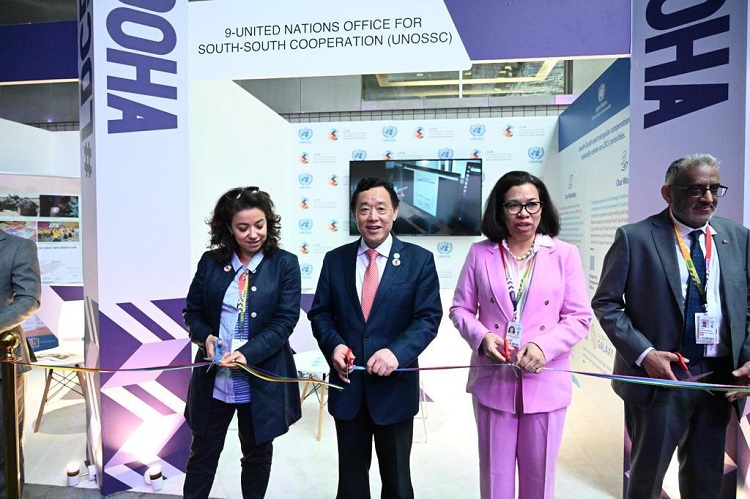UNOSSC, IBSA and India-UN Fund outreach for development of least developed countries

5 March 2023, Doha – On the sidelines of the Fifth United Nations Conference on the Least Developed Countries, the catalytic power of South-South cooperation to enable transformational development in least developed countries was celebrated. Eminent personalities from India, Brazil, The Gambia, Malawi, Uganda, South Africa, Timor-Leste and officials from the Food and Agriculture Organization of the United Nations (FAO), United Nations Development Programme (UNDP), United Nations Office for South-South Cooperation (UNOSSC), UN Capital Development Fund (UNCDF) and WHO attended the event.
UNOSSC-managed South-South Trust Funds have directly supported 32 least developed countries, with more participating in multi-country or global projects.
The India-UN Development Partnership Fund, a US$ 150 million financing mechanism, established in 2017, has supported 24 projects in 18 least developed countries, while also prioritizing projects in 29 small island developing states and 10 landlocked least developed countries.
The India, Brazil, South Africa Facility for Poverty and Hunger Alleviation (IBSA Fund), established in 2004, has supported 22 projects in 20 least developed countries – accounting for more than 62% of its total resources.
The Perez-Guerrero Trust Fund for South-South Cooperation has provided 384 small multi-country project grants, while the United Nations Fund for South-South Cooperation has facilitated global initiatives that have contributed to least developed countries advancing development pathways.
Bridging outreach with financial commitments, the IBSA Fund funded 2 new projects in The Gambia and Uganda, jointly amounting to US$ 3 million.
In The Gambia the "Enhanced Vegetable Production and Processing Project for Rural Women and Youth" project seeks to increase food security and livelihoods of women and youth through improved agricultural methods and irrigation structures. FAO is the implementing partner of this project, working with the Gambian Ministry of Gender, Children and Social Welfare. Among others, processing and value-addition capacities of women and youth will be enhanced through the providing training and the marketing and financing capacities of approximately 500 rural women and youth will be strengthened through training on entrepreneurship, marketing dynamics, production planning, and through the facilitation of the formation of women and youth producer cooperatives.
“The Gambia has been a strong advocate of South-South cooperation since we know firsthand the impact these projects have had on vulnerable communities. The project we launched today, will empower women and youth to produce more and better food, enhancing the nutrition and food security of our country,” affirmed H.E. Dr Mamadou Tangara, Minister of Foreign Affairs and International Cooperation, The Gambia.
In Uganda, the ‘Karamoja greenbelts’ women-led large-scale farming of cereals, legumes and oilseed project will support the Government of Uganda in sustainably addressing chronic food insecurity in the Karamoja region by empowering women and youth through agro-industry. UNDP is the implementing partner of this project, working with the Ministry of Agriculture, Animal Industry and Fisheries; Ministry of Gender, Labor and Social Development; and Ministry of Finance, Planning and Economic Development. Among others, at least 5 large-scale farms measuring at least 100 acres, and 27 Karamojong women and youth groups, associations or cooperatives will be organized to manage communally owned land for large-scale climate smart cultivation of improved varieties of cereals, oilseeds and legumes.
Attending the signing ceremony on behalf of IBSA countries were: H.E. Mr. Srinivas Gotru, Joint Secretary, United Nations Economic and Social Division, Ministry of External Affairs of India; H.E. Ruy Pereira, Director of the Brazilian Cooperation Agency; and H.E. Mr. Ghulam Hussein Asmal, Ambassador of South Africa to Qatar.
“India’s participation in the IBSA Fund and India-UN Fund reflects our enduring commitment to South-South cooperation, especially towards the least developed countries,” stated H.E. Mr. Srinivas Gotru, Joint Secretary, United Nations Economic and Social Division of the Indian Ministry of Foreign Affairs. Other attendees included: H.E. Dr. Mamadou Tangara, Minister of Foreign Affairs and International Cooperation, The Gambia; Honorable Sosten Gwengwe, Minister of Finance and Economic Affairs of Malawi; Ms. Aldalijza Magno, Minister of Foreign Affairs and Cooperation of Timor-Leste; Ms. Dima Al-Khatib, Director, UNOSSC; QU Dongyu, Director-General, FAO; Mr Xavier Michon, Deputy Executive Secretary of UNCDF and Dr. Rayana Bouhaka, WHO Representative in Qatar.
A series of videos featured UNOSSC South-South Trust Fund projects work in least developed countries.
The UNOSSC financially manages and supports implementation of trust funds that facilitate collaboration and piloting of South-South initiatives across the globe, serving as Trust Fund manager and Secretariat of the Board of the IBSA Fund.
“The rich portfolio of South-South cooperation projects featured today is a testament to the transformational impact that results when developing countries cooperate with each other and in partnership with the United Nations System. We believe in the potential of South-South Cooperation and its ability to flip the script for least developed countries,” affirmed Dima Al-Khatib, UNOSSC Director.


